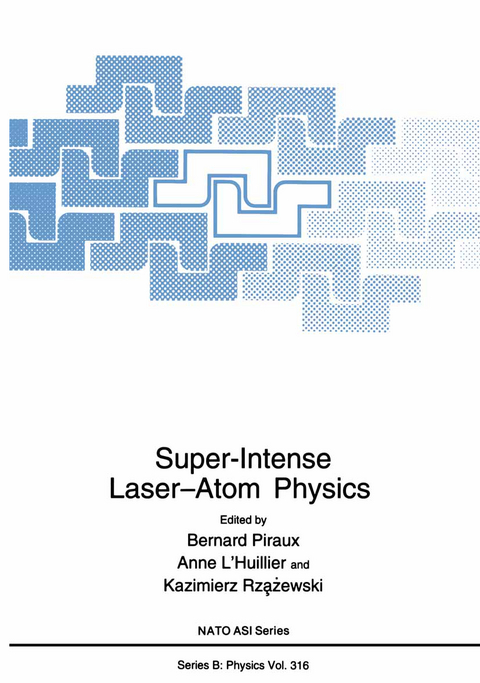
Super-Intense Laser—Atom Physics
Springer-Verlag New York Inc.
978-1-4615-7965-6 (ISBN)
The rapid development of powerful pulsed lasers is at the origin of a conside rable interest in studying the response of an atom, a molecule (or a solid) to a strong electromagnetic field. It is now possible to produce at the laboratory scale, ultra-short 13 pulses with a duration of 100 femtoseconds (10- second) and a power of the order 12 of 1 terawatt (10 Watt). Under these conditions, very high peak intensities may be obtained and electric fields exceeding typical electron binding fields in atoms are generated. The interaction of an atom or a molecule with such electromagnetic fields has a highly non-linear character which leads to unexpected phenomena. Amongst them, - above-threshold ionization (ATI) i.e. the absorption of additional photons in excess of the minimal number necessary to overcome the ionization potential and its molecular counterpart, above-threshold dissociation (ATD); - generation of very high harmonics of the driving field; - stabilization of one-electron systems in strong fields. These processes were the main topics of two international meetings which were held in 1989 and 1991 in the United States under the common name SILAP (Super-Intense Laser-Atom Physics).
Silap III: an Overview.- I: Generation of High Harmonics.- Recent Results in High-Order Harmonic Generation.- Angular Distributions of High-Order Harmonics.- Angularly Resolved Ultra High Harmonic Generation Experiments with Picosecond Laser Pulses.- High-Order Sum and Difference-Frequency Generation in Helium.- Contribution of Bound-Bound Transitions to High-Order Harmonic Generation.- Symmetry Breaking and the Control of Harmonics with Strong Short Laser Pulses.- Propagation of Intense Ultrashort Pulses and Harmonics in Gases.- Multiple Harmonic Radiation From Metal Surfaces Induced by Strong Laser Pulses.- II: Dynamics of Multiphoton Ionization of Atoms.- Dynamics of Short-Pulse Excitation, Ionization and Harmonic Conversion.- Atoms in Super-Intense Fields: Stabilization, Ionization and High-Harmonic Emission.- Multiphoton Ionization of Atomic Hydrogen in Intense Laser Pulses: The Role of Rydberg States.- Structure in the Above Threshold Ionization (ATI) Spectrum under Strong Femtosecond Pulses.- Ionization in Strong Fields.- Stabilization of Excited States and Harmonic Generation: Recent Theoretical Results in the Sturmian-Floquet Approach.- The Use of the Time Correlation Function in Floquet Theory.- Some Recent Developments in Multiphoton Ionization of Atoms in Intense Fields.- Atomic State Effects in Stabilization.- Stabilization Within a Classical Context.- Dynamical Stabilization of Atoms at Current Laser Performances.- Strong-Field Interference Stabilization in Atoms and Molecules.- Stability of Hydrogen Atom in Rydberg States in a Laser Field.- Stepwise Decay in the Photoionization of Rydberg Atoms.- Population Trapping in Excited States.- Atomic Physics with Intense, Subpicosecond Half-Cycle Pulses.- R-Matrix-Floquet Theory of Multiphoton Processes.- Ionization of Hydrogen Atoms by Circularly Polarized E-M Field.- III: Dynamics of Photoionization and Photodissociation of Molecules.- Ionization of H2+ in Intense Laser Fields.- Dynamics of Dissociation Versus Ionization in Strong Laser Fields.- Molecules in Strong Laser Fields: Why are the Fragments Aligned ?.- Stabilization and Coherence in the Photodissociation of Diatomic Molecules by Intense Lasers.- IV: Interaction of a Two-Electron System with a Strong Field.- Single and Double Photoionization of Two-Electron Systems.- Sequential vs. Simultaneous Ionization of Two-Electron Atoms by Intense Laser Radiation.- Two-Electron Atoms in Ultra Short, Intense Pulses.- Quasiclassical Approach to Ionization of Atoms by Strong Laser Pulses: Comparison with the “Simpleman’s” Models and Newtonian Dynamics.- Stabilization of Multielectron Atoms: Classical Approach.- Multiphoton Detachment of Hydrogen Negative Ion.- Strong Field Predictions for Negative Ions in Short Laser Pulses.- H- in Intense Laser Fields: Laser-Induced Exited States and Dichotomy.- Electron-Energy Resolved Experiments on Multiphoton Detachment from Negative Ions.- Observation of Resonant Excess Photon Detachment Via a Window Resonance in the Negative Cesium Ion.- Author Index.
| Reihe/Serie | NATO Science Series: B ; 316 |
|---|---|
| Zusatzinfo | 518 p. |
| Verlagsort | New York, NY |
| Sprache | englisch |
| Maße | 178 x 254 mm |
| Themenwelt | Naturwissenschaften ► Chemie ► Physikalische Chemie |
| Naturwissenschaften ► Physik / Astronomie ► Atom- / Kern- / Molekularphysik | |
| Naturwissenschaften ► Physik / Astronomie ► Mechanik | |
| Naturwissenschaften ► Physik / Astronomie ► Optik | |
| Naturwissenschaften ► Physik / Astronomie ► Quantenphysik | |
| Technik ► Elektrotechnik / Energietechnik | |
| ISBN-10 | 1-4615-7965-1 / 1461579651 |
| ISBN-13 | 978-1-4615-7965-6 / 9781461579656 |
| Zustand | Neuware |
| Informationen gemäß Produktsicherheitsverordnung (GPSR) | |
| Haben Sie eine Frage zum Produkt? |
aus dem Bereich


